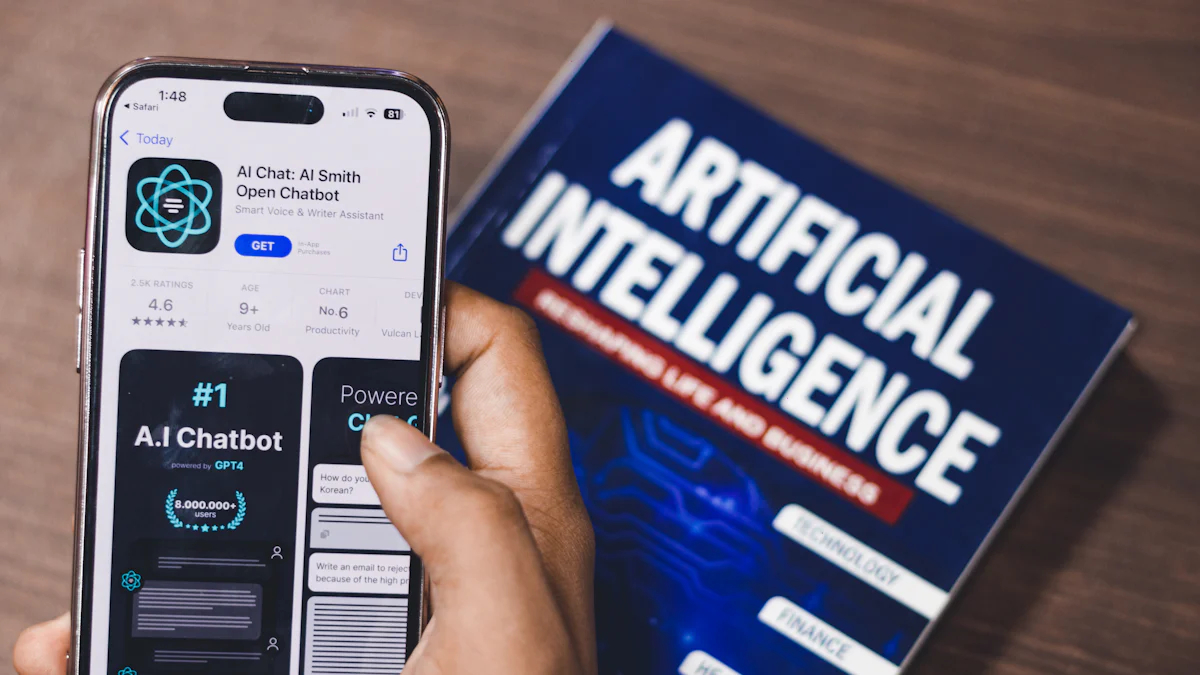Are We Losing Authenticity in a World of AI-Generated Content?

In today's digital age, AI-generated content surrounds you more than ever. From news articles to social media posts, artificial intelligence plays a significant role in content creation. This surge in AI usage raises important questions about authenticity. Are we losing authenticity in the messages we consume daily? Many people worry that AI lacks the human touch necessary for genuine connection. As AI continues to evolve, understanding its impact on authenticity becomes crucial for everyone navigating this new landscape.
Understanding AI-Generated Content
The Rise of AI in Content Creation
Technological advancements driving AI content
You live in an era where technology evolves rapidly. AI has become a powerful tool in content creation. It uses complex algorithms to generate text, images, and even videos. These advancements allow AI to produce content quickly and efficiently. You might notice AI-generated articles or social media posts that seem almost human-like. This technology continues to improve, making AI a popular choice for many industries.
Popularity and adoption across industries
AI's ability to create content efficiently has led to its widespread adoption. Businesses use AI to generate marketing materials, news outlets employ it for reporting, and even entertainment industries explore AI for scriptwriting. You see AI's influence in various sectors because it offers speed and cost-effectiveness. However, this popularity raises questions about the authenticity of the content you consume.
Characteristics of AI-Generated Content
Efficiency and scalability
AI-generated content excels in efficiency and scalability. It can produce large volumes of content in a short time. For businesses, this means meeting high demands without increasing costs. You benefit from timely information and diverse content options. AI's ability to scale content production makes it an attractive solution for companies looking to expand their reach.
Lack of emotional resonance and strategic thinking
Despite its efficiency, AI-generated content often lacks emotional depth. You may find that AI struggles to convey genuine emotions or connect with audiences on a personal level. This absence of human touch can lead to content that feels mechanical or impersonal. Additionally, AI lacks strategic thinking. It follows programmed instructions without understanding context or nuance. This limitation means AI-generated content might miss the mark when it comes to engaging storytelling or addressing complex topics.
Scientific Research Findings: A study on AI content creation using KoalaWriter found that AI-generated content often requires heavy editing for positive results. This highlights the need for human intervention to ensure quality and authenticity.
Concerns About Losing Authenticity

Emotional Disconnect
The absence of human touch
In a world where AI-generated content is becoming more prevalent, you might notice a lack of human touch in the messages you receive. AI can produce content quickly, but it often misses the nuances that come from human experience and emotion. This absence can make the content feel mechanical or impersonal. You may find it challenging to connect with such content on a deeper level, as it lacks the warmth and empathy that human creators naturally infuse into their work. This emotional disconnect raises concerns about losing authenticity in the narratives you engage with daily.
Impact on audience engagement
When content lacks emotional resonance, it can significantly impact how you engage with it. Authenticity plays a crucial role in capturing your attention and fostering a genuine connection. Without it, you might feel less inclined to interact with the content, leading to lower engagement rates. This can be particularly problematic for brands and creators who rely on meaningful interactions to build relationships with their audience. As AI-generated content continues to rise, the challenge lies in maintaining the authenticity that keeps you engaged and invested.
Consumer Trust and Skepticism
Evidence of skepticism in AI content
Consumer trust is vital in any form of communication. However, the rise of AI-generated content has led to increased skepticism among consumers like you. A survey involving over 1,200 U.S. consumers revealed that 53% are not familiar with companies’ use of AI in advertisements. This lack of awareness contributes to doubts about the authenticity of the content you encounter. When you sense that a message might be generated by AI, you may question its credibility and the intentions behind it. This skepticism highlights the importance of transparency in content creation to ensure you feel confident in the information you receive.
High bounce rates and their implications
High bounce rates often indicate that users, like you, are not finding the content engaging or trustworthy. When you encounter AI-generated content that lacks authenticity, you might leave the page quickly, resulting in a high bounce rate. This behavior suggests that the content failed to capture your interest or meet your expectations. For businesses and content creators, high bounce rates can have significant implications. They may signal a need to reevaluate their content strategies and prioritize authenticity to retain your attention and trust. Balancing AI efficiency with genuine human input becomes essential in addressing these concerns and preventing the loss of authenticity in digital communication.
Balancing AI Efficiency with Human Authenticity

Leveraging AI for Efficiency
Benefits of AI in content production
AI offers several advantages in content production. You can benefit from its ability to generate large volumes of content quickly. This efficiency allows businesses to meet high demands without increasing costs. AI can handle repetitive tasks, freeing up time for you to focus on more creative endeavors. Additionally, AI tools can analyze data and trends, providing insights that help tailor content to specific audiences. This capability ensures that you receive relevant and timely information.
Areas where AI excels
AI excels in areas that require speed and precision. It can produce content in multiple languages, making it a valuable tool for global communication. You might notice AI's effectiveness in generating factual and objective content, such as news summaries or product descriptions. AI also shines in data-driven tasks, like optimizing search engine results or personalizing recommendations. These strengths make AI an essential component in modern content strategies.
Case Study: In a study on AI-generated content in blogging, AI content required heavy editing for successful results. This highlights AI's role in content production, where it provides a foundation that human editors refine for quality and authenticity.
Maintaining Human Input
Importance of human creativity and insight
Human creativity and insight remain crucial in content creation. You bring unique perspectives and emotional depth that AI cannot replicate. Your ability to understand context and nuance adds authenticity to the narratives you create. Human input ensures that content resonates with audiences on a personal level, fostering genuine connections. By combining your creativity with AI's efficiency, you can produce content that is both engaging and authentic.
Strategies for integrating human elements
To maintain authenticity, you can adopt strategies that integrate human elements into AI-generated content. Here are some approaches:
Collaborative Editing: Work alongside AI tools to refine and enhance content. Your edits can add emotional resonance and strategic thinking.
Storytelling Techniques: Use storytelling to infuse content with human experiences and emotions. This approach helps create relatable and memorable narratives.
Ethical Considerations: Address ethical concerns by preparing for new roles created by AI applications. This preparation ensures that you adapt to changes while maintaining authenticity.
By leveraging AI's strengths and incorporating human creativity, you can achieve a balance that preserves authenticity in content creation.
The Future of Content Creation
Trends in AI and Content
Emerging technologies and their potential
You stand on the brink of a new era in content creation. Emerging technologies like generative AI systems can automatically create content based on text prompts. This capability opens up vast possibilities for innovation. You might see AI crafting personalized stories, generating realistic images, or even composing music. These advancements promise to revolutionize how you interact with digital content. However, they also raise ethical concerns about data privacy, security, and the potential misuse of AI-generated materials.
Predictions for AI's role in content
In the future, AI will likely play an even more significant role in content creation. You can expect AI to handle routine tasks, allowing you to focus on creativity and strategy. AI might assist in analyzing audience preferences, tailoring content to meet specific needs. As AI technology evolves, it could surpass human capabilities in certain areas. This shift necessitates a careful examination of control and accountability. Collaboration among technologists, policymakers, and ethicists will be essential to ensure responsible AI deployment.
Preserving Authenticity
The role of human oversight
Human oversight remains crucial in maintaining authenticity in AI-generated content. You bring unique insights and emotional depth that AI cannot replicate. By overseeing AI processes, you ensure that content aligns with ethical standards and resonates with audiences. Your role involves guiding AI to produce narratives that reflect genuine human experiences. This oversight helps prevent the loss of authenticity and fosters trust in the content you consume.
Encouraging authentic storytelling
To preserve authenticity, you should encourage storytelling that reflects real human emotions and experiences. Authentic storytelling involves sharing personal anecdotes, exploring diverse perspectives, and addressing complex themes. By integrating these elements into AI-generated content, you create narratives that engage and inspire. You can use storytelling techniques to infuse content with warmth and empathy, ensuring that it resonates with audiences on a deeper level. This approach not only preserves authenticity but also enriches the digital landscape with meaningful and relatable stories.
As you look to the future of content creation, consider the balance between AI efficiency and human authenticity. The rise of AI-generated content challenges you to discern what is truly genuine. 72% of consumers find it difficult to determine authenticity in AI content. This highlights the importance of preserving the human touch. Reflect on your experiences with AI-generated content. Ask yourself: Does it resonate with you? By valuing authenticity, you contribute to a digital landscape that prioritizes genuine connections and meaningful narratives.
See Also
Exploring the Moral Dilemmas of AI-Created Content
Is Labeling AI-Created Content Necessary?
Is AI-Produced Art Truly Artistic?
Is Generative AI a Threat to Human Creativity?
The Impact of Generative AI on Educational Content Development
